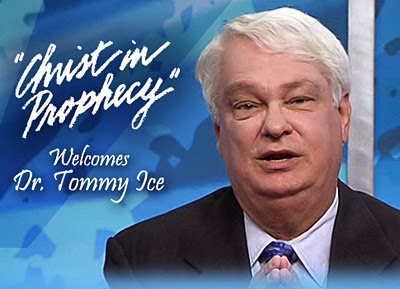How has the Rapture been taught throughout history?
To answer this question, we are pleased to have as our special guest the renowned Bible Prophecy teacher, Dr. Tommy Ice. Tommy is the head of the Pre-Trib Research Center and is a prolific writer on all aspects of Bible prophecy.

Historical Teachings
Nathan Jones: Some will argue that the Rapture is too new of a concept to be true. They say it was only invented by Darby in the 1800’s. There’s no history of the Rapture being taught in the Church. Is that all true?
Dr. Ice: Only in a certain sense. But in another sense, we today have great access to historical literature and so we are finding that in periods where people studied the Bible there are references to the Rapture.
For example, the Puritans in the 1600’s produced a great Bible study movement. After 1,500 years of basic illiteracy throughout the world, only one in 2,500 could read. If you look at Church history overall, only about one person in every 40 years even knew Hebrew in the Church, let alone Greek. You had the learning in the 1500’s of Greek and Hebrew and the translation of the Bible into the people’s language. And, as a result, for the first time really in history the average person had access to a Bible. The reason was that there was a rise of the middle class and they could afford a Bible. You also had the average person learning how to read. So, when the Puritans started studying the Bible, the people also started talking about Pre-Millennialism, the Rapture, and Israel.
Compare learning to during the Middle Ages, when this information could be controlled by a few.
Dr. Reagan: Yes, in fact the Church was very anti-Israel and very anti-Semitic. The priests didn’t want anybody to even know about the Jewish roots of the Church.
Dr. Ice: That’s right. In fact, most people during those first 1,500 years would have thought that Jesus was not Jewish at all because He criticized the Scribes and Pharisees. They would then use that against Him.
Dr. Reagan: So, basically what you saying is that once people got the Bible in their own languages starting in the 1500’s and into the 16th Century, they got the Word in their own languages. Once they could read for themselves, they began to interpret the Bible. “The Bible says this, and the Bible says that.”
Dr. Ice: The average person for the first 1,500 years AD just knew the big events of the Bible. They didn’t know the details, especially the Old Testament. They knew about the Creation, the Flood, and a few other events.
Dr. Reagan: Also the facts about Jesus’ life. In fact, if you go into the cathedrals in Europe today, every one of them has the life of Jesus painted on the walls all around them. These paintings were used to take the people by them and say, “Alright, Jesus was born of a virgin.” They would go around to all these paintings, but due to their illiteracy, that’s all they knew about God’s Word.
Dr. Ice: Yes, that’s all they knew. If they had a question, they would ask their priest, who likely couldn’t even read himself.
Nathan Jones: Historically, though, that the ideas around and about Pre-Millennialism and the Rapture were never taught is untrue. The Early Church fathers’ such as Barnabas (ca.100-105), Papias (ca. 60-130), Justin Martyr (110-195), Irenaeus (120-202), Tertullian (145-220), Hippolytus (ca. 185-236), Cyprian (200-250), and Lactantius (260-330) wrote on the imminent return of Jesus Christ, the central argument for the Pre-Tribulation Rapture view.
Biblical truth is determined by Scripture, and not how that teaching has been perceived at different times during history. When Augustine began spiritualizing the Bible, his view of a non-literal interpretation took hold of the church until the Renaissance, obliterating the Premillennial and Pre-Tribulation Rapture views in favor of Amillennialism. But, some Medieval writers such as Ephraem of Nisibis (306-373), Abbot Ceolfrid’s Latin Codex Amiatinus (ca. 690-716), and Brother Dolcino wrote statements that distinguish the Rapture from the Second Coming.
When the chains of allegorical interpretation began to fall off beginning with the Reformation in the 1400 and 1500s, writers such as Joseph Mede (1586-1638), Increase Mather (1639-1723), Peter Jurieu (1687), Philip Doddridge (1738), John Gill (1748), James Macknight (1763), Thomas Scott (1792) and Morgan Edwards (1722-1795) all wrote concerning the Rapture occurring separate from the Second Coming. Even in the more modern church, those like William Witherby (1818) were precursors to John Darby in support of the view.
The Pre-Tribulation Rapture view is indeed then not only biblical, but supported throughout Church history.
Dr. Ice: Right. We also found the Rapture in the writings of Pseudo-Ephraem from the 4th Century. We have recently found one even sooner in the Apocalypse of Elijah from North Africa.
Dr. Reagan: Of course, that points to the problem in the Middle Ages, that if people wrote about anything different from the Catholic Church’s doctrine, not only were they burned at the stake but their writings were burned as well. A lot of historic writings were lost.
Dr. Ice: Exactly. The literal interpretation of the Bible was suppressed, especially starting around the year 500 AD. For example, Jerome said away with a 1,000 years in his Daniel commentary. Augustine shifted from Pre-Millennial to Amillennialism. What you had in North Africa is Alexandria had become the center of Greek philosophy which had moved from Athens to Alexandria. They for some reason hated the idea that we were going to have a literal, physical kingdom of Christ that will last a thousand years.
Dr. Reagan: When people say the Rapture is too new of a teaching to be true, one time I was thinking about that and it suddenly occurred to me that if you’re going to go with that argument, then you would have to say that salvation by grace through faith is too new to be true.
Dr. Ice: Yes, that was a biblical teaching that was suppressed for 1,500 years. So too was the substitutionary atonement by Anselm in the year 1,000 AD.
Dr. Reagan: Bible prophecy was also suppressed. The Bible itself says that many things about Bible prophecy would not be understood until the time comes for them to be understood.
Dr. Ice: That’s right. We have a development of the Church understanding its doctrine over time. The Early Church was futurists like us as they believed in a literal Tribulation, but that’s also when the Church’s anti-Israel attitude was developed.
It’s not until the Puritans basically re-established the reading of the Bible is when we get the idea of Judeo-Christianity. It didn’t come from Europe. You have it developing in the English speaking world primarily from the Puritans who fell in love with the Old Testament. Our Puritan forefathers in America did not have the European anti-Semitic medieval tradition that they had. That’s why Americans are more open to Bible prophecy compared to the rest of Christendom. As a result, they started studying the Old Testament.
It still took another couple hundred years until the late 1700’s and early 1800’s before we begin to see in writings a distinction between Israel and the Church. When people saw that, they became open to the idea of a Rapture and that the Church had to be removed before God could finish His plan and program with Israel during the 70th Week of Daniel.
In the third segment of our interview with Dr. Tommy Ice concerning the Pre-Trib Rapture, he’ll debunk the myths concerning John Nelson Darby.










Daniel 12:8 " And I heard, but I understood not: then said I, O my Lord,what shall be the end of these things?" & 12:13 "But go thou thy way till the end be: for thou shalt rest, and stand in thy lot at the end of the days." These words are a picture of many things not understood until the TIME it is to be understood. God Bless!